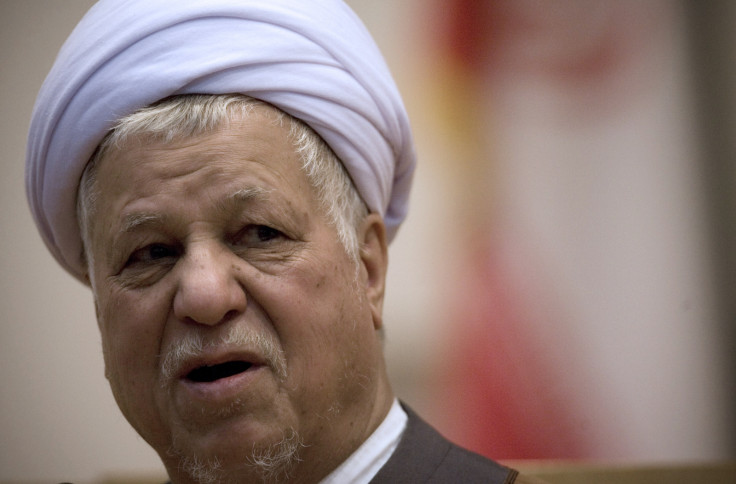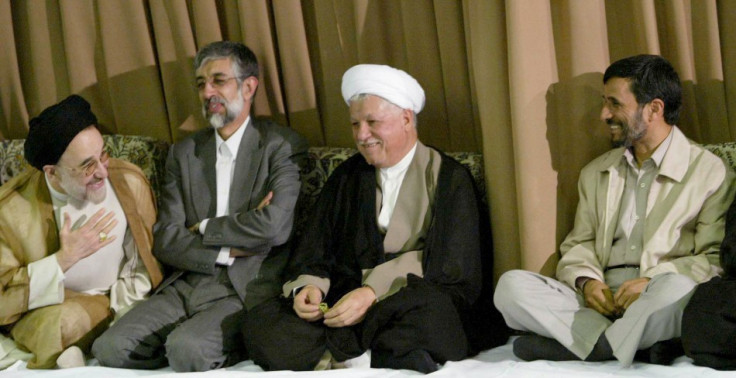The death of Akbar Hashemi Rafsanjani spells political turmoil for Iran
President Hassan Rouhani loses an important mentor and supporter less than six months before the next elections.

Iranian political leaders mourned the death of the late Iranian leader Akbar Hashemi Rafsanjani, who passed away on 8 January after suffering from a heart attack. Newspapers in the country prominently featured his photo and speeches in the wake of his death, as the Islamic Republic observes three days of mourning and awaits his funeral on 10 January.
But for a country heading to the polls in less than six months, the death of a politically-significant figure such as Rafsanjani spells uncertainty for the future as incumbent President Hassan Rouhani loses a mentor and an ally. Political analysts fear Rouhani will have to seek support on the more radical fringes of Iranian politics to be reconfirmed as president in the May elections.
"Now, with about six months to the next presidential election, there are so many pressures on Rouhani's administration," Hamid Reza Shokouhi told the Associated Press (AP), adding "Rafsanjani could manage it, if he were still alive." Iranian citizens also share these feelings, according to the news agency. "I don't know who is going to fill his place. He kept Iran safe from hard-liners for so long," said Maziar Rezaei, a real estate agent, as quoted by AP.
Rafsanjani first served as a close aide to Ayatollah Ruhollah Khomeini during the 1979 Islamic Revolution and eventually ruled the country as president from 1989 to 1997, coming to power just a few months before Khomeini's death. Known at the time for his ruthlessness, suspected of sponsoring killings of political dissidents abroad and accused of human rights abuses, he also helped fund the country's controversial nuclear programme. In recent years he reportedly backed the nuclear disarmament deal, known as the Joint Comprehensive Plan of Action, which was implemented in January 2016 in what was hailed as a victory of diplomacy in containing Iran's nuclear threat.
In 2005, Rafsanjani ran again for the presidency, but was defeated by Mahmoud Ahmadinejad, whom he opposed again in 2009, when Ahmadinejad's re-election was tainted by widespread accusation of fraud, sparking a protest known as "the Green movement". This put Rafsanjani on the opposite side of Ahmadinejad-backer Ayatollah Ali Khameini, who succeeded Khomeini as Iran's supreme leader, and began a rift among the country's leadership.

Rafsanjani was seen as a voice for the moderate forces in the country, with people outside the hospital where he died chanting the names of 2009 opposition leaders Mir-Hossein Mousavi and Mehdi Karroubi, who are under house arrest. But according to the exiled Iranian opposition group People's Mojahedin Organisation of Iran, also known as Mujahedeen-e-Khalq (PMOI/MEK), Rafsanjani was the regime's number two, acting as a balancing factor and ensuring its preservation.
Maryam Rajavi, the leader of the group, said that his death will represent a pivotal moment for the regime, as it weakens the regime's balance and raises questions on how to ensure the survival of the regime: "With the death of Ali Akbar Hashemi Rafsanjani, one of the two pillars and key to the equilibrium of the religious fascism ruling Iran has collapsed and the regime in its entirety is approaching overthrow."
The group's spokesman Shahin Gobadi told IBTimes UK that Rafsanjani's death shatters the illusion of a moderate side to the Iranian regime, as the rule of Rafsanjani-backed Rouhani tends to be seen in comparison to his predecessor Ahmadinejad.
"This whole bipolar situation has gone. The illusion about the moderation will be shown in his baselessness. People will have to see the regime for what it is." Gobadi said, mentioning the country's record in executions per capita, the highest in the world, and continuous records of human rights abuse as also recently highlighted by a UN expert focusing on human rights in the country.
Special rapporteur Asma Jahangir denounced the imprisonment of eight people who have been conducting prolonged hunger strikes to protest against their detention. He called on the country's leaders to release all prisoners "arbitrarily detained" for exercising their rights to freedom of opinion and expression.
According to Gobadi, the UN can do more to support the plight of political prisoners in the country. "The international community should base its relationships with Iran, especially its trade relations, on the improvement of the human rights situation in the country."
Celebrities who have died in 2017, in pictures
© Copyright IBTimes 2025. All rights reserved.






















